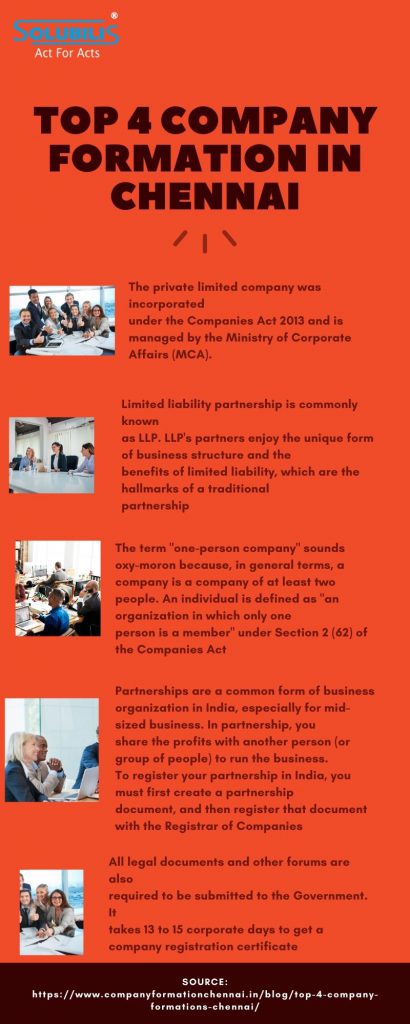Chennai is one of the 4th largest cities in India; and one of the fastest growing cities for start-ups and business. It has now become the hub for many of the entrepreneurs to start a business. No wonder either it is a start-up or the corporate business Chennai is the centre of attraction. We have great pleasure to inform that we Solubilis are here to render the service on company formation in Chennai; with customer satisfaction as high priority and at an affordable cost. In this blog we are talking about features and benefits of Private Limited Company Registration ; LLP Registration, OPC or Partnership, company formation in chennai; as many of the entrepreneurs always face legal hurdles when they wish to start a new company in Chennai. Under the Fundamentals of Company formation in Chennai; the company name must first have approval, and then an application must be filed.
All legal documents and other forums should have the submission to the Government Authority in the same process. It takes 13 to 15 corporate days to get a company registration certificate. Either way, we offer you the complete services of a company incorporation and business establishment in Chennai.

Private limited company registration
Private Limited Company Registration is a popular choice to start a business in India through start-ups and businesses with high growth aspirations.
The private limited company had incorporation under the Companies Act 2013; and has the management by the Ministry of Corporate Affairs (MCA). It is a registered corporate entity that provides unique legal recognition to the business from its owners.
Legal & Separate Entity
Pvt Ltd company has the limit by company shares, has a special legal entity status; i.e. the company has treatment as a separate person from the investor and the company owner. It therefore has its own legal capabilities and can take legal action against frauds.
Limited liability
Private Limited company has limited liability to the extent of share capital issued by the Company. The liability of the company has the limit to its assets and the personal characteristics of the members; directors have no consideration for the company creditors.
Perpetual succession
A merged entity has a permanent legacy. Permanent inheritance means that the company exists even if the member dies or ceases to exist. Changes in management do not affect the identity of the company; the company has the same powers, immunity, estates and assets. The company will exist until the injury in accordance with the provisions of the relevant law.

Easily transferable owner
Shares and other interest of any member of the Company are movable property; have the transfer in the manner provided by Articles of such Company. Therefore, it is easy to subscribe or leave the company membership. Transferring ownership is also easy.
Taxation
Because everyone wants to reduce their tax burden; the Income Tax Act 1961 has another major advantage for the company of a tax merger. Companies often have tax at a lower rate and offer better taxable benefits compared to other types of business entities.
LLP registration
Limited liability partnership known as LLP. LLP’s partners enjoy the unique form of business structure and the benefits of limited liability, which are the hallmarks of a traditional partnership.
This type of business entity has preference by individuals over other types of business structures because the flexibility offered by this type of entity outweighs all other types of entities.
Benefits of LLP

Disputes and LLP Agreement
One advantage enjoyed by people who go for limited liability registration is that disputes can be handled appropriately. The LLP agreement has a design for a limited liability partnership; just as a shareholder agreement has the draft for a private limited company. Through this agreement, any disputes that may arise between the partners can be easily resolved.
Minimum amount of compliance
LLP requires limited compliance compared to other types of business entities. For example, limited liability partnership registration does not require a minimum amount of capital. Other than that, there is no need to conduct an audit. However, this requirement is only if the annual turnover of the LLP is less than 40 lakhs and 25 lakhs.
Operational Flexibility
The LLP Agreement, which is a document between LLP’s partners, including the rights and responsibilities of the partners. Generally, the LLP elects a “designated member” who oversees day-to-day operations. It can include individuals or existing businesses as members. Furthermore, this structure allows for a clear definition of the roles of partners and their responsibilities. It also helps protect the partner’s interest when they have harm by any other partner’s illegal activity.
The LLP enjoys most of the benefits like perpetual succession, limited liability and as separate legal entity.
One Person Company

The term “one-person company” sounds oxy-moron because, in general terms, a company is a company of at least two people. An individual company has definition as “an organization in which only one person is a member” under Section 2 (62) of the Companies Act.
In addition, Rule 2.1 of the Draft Rules under the Companies Act, 2013 clarifies the term “person” stating that the person by law must be a natural person.
Features of One Person Company
- It follows the principle of perpetual succession
- OPC has a distinct and legal entity
- One Person Company should hold annual general meeting within a year of the incorporation
- The sole member should name a nominee
- The One person company can enjoy special features that other forms of the companies do not have.
Partnership firm
Partnerships are a common form of business organization in India, especially for mid-sized business. In partnership, you share the profits with another person (or group of people) to run the business. To register the partnership in India, one must first create a partnership document, and then register that document with the Registrar of Companies.
Partnership registration is not necessary, but provides proof of your company’s existence; and allows you to switch to another company, such as LLP or Company.
Features of the Partnership firm

Agreement: Contract is the basis for partnership. There should be no partnership without agreement. The primary motto of the contract should be for business & profit. Partnership is the result of an agreement, not by birth or any other relationship. The agreement may be oral or in writing. It has legal significance & it can have the submission as evidence in court. This is to resolve the dispute between the future partners.
Profit Sharing:
The main objective of the partnership is to make a profit and share these profits equally or by agreement. If the agreement does not speak they will share the profits equally. It is as given in the “Indian Partnership Act, 1932”. A non-profit organization cannot have consideration as a partner.
Legal business existence:
The business of the partner company must be for profit and it must be in accordance with land law. The partnership does not conduct charitable activities.
General (joint) management: All partners can actively have involvement in management. This means that the partnership has general management. But practically it is not possible & convenient. It is therefore have management by one or both partners on behalf of all other partners.
To know what are the documents necessary for the above forms of the companies; to have registration and to know further details please click here: company formation in Chennai


